Locksmiths Top Tips For Locks and Security
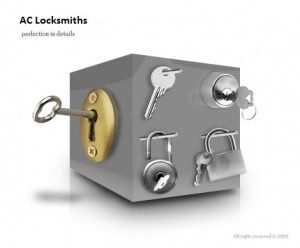
1. Instead of leaving a key in your back door, take a back door key with you when you leave the house. Almost every time I attend an emergency where my customers have lost their keys, they show me the back door with the key in the other side. Carrying a key for the back door in a separate pocket to your front door key gives you a greater chance of being able to get in without waiting for a locksmith. It is also better for security because all the time a key is in your back door, a burglar can break in through a window and easily carry stuff out of your house through that back door!
Leaving keys in doors is good fire safety practice while people are in the property, but they should be removed from locks if the property is empty.
2. Oil your locks regularly – at least twice a year. The best way to remember is to do it every time you change your clocks, w
This is especially important if you live near the sea. Don’t just spray where the key goes in. Most locks have a latch that retracts when you pull the handle down, when the latch retracts, the wedge makes a gap for your oil or silicone spray. Spray for around 5 seconds to get plenty inside, then turn the key a few times to make sure the lubricant reaches all parts. If you have a locking mechanism with lift up handles, works the handles up and down a few times, but make sure you lubricate all moving parts (bolts, hooks, rollers, etc.)
3. Do not put your override keys to your safe inside the safe. Equally, do not leave the override keys anywhere in your property. A burglar can find those keys and get to your valuables. They will know the hiding places you think are sneaky.
Safe keys should be with a trusted friend or family member in an entirely separate property. Also, do not wait for the batteries to get low. Change them annually whether they need it or not. Always consult a security expert before buying a safe because they can advise you on the pitfalls many are trapped by. There is nothing worse than needing your passport from a safe you cannot access and finding out the safe expert cannot get to you for two days by which time, your plane has departed!
4. Please stop posting on social media all about your holiday whilst away. Your friends probably don’t care as much as you would like to think, but the burglar is very thankful you are advertising that your property is empty. Don’t ruin your holiday by coming back to find all your valuables have been taken. You can post your holiday highlights when you get back.
5. When you get extra keys cut, use the originals most. Badly cut keys ruin locks. Key cutters use generic key blanks made from cheaper metals. If you buy your locks from a locksmith, they can order branded keys made for the lock cut from superior metal. These will then be covered by guarantee. Once you use a poorly cut off brand key, and it damages the lock, you invalidate any guarantee given by your locksmith. So if you must get spares made, try to use the originals the most.
6. Be wary if you have a family member who suffers with dementia. This is a sensitive subject but I have experience of a good number of customers coming back to me because they have lost their keys. The excuses are often the same, with angry accusations at neighbours or carers who have ‘let themselves in and stolen my keys again.’ The last thing a locksmith wants is to take advantage of anyone with this awful condition, but we cannot change locks for free. We also cannot ask the customer for phone numbers of family members because it is not right to do so.
If your loved ones are getting forgetful and you notice new locks, firstly try and get a key for yourself. Then, see if you can find out which locksmith they used. I would be more than happy if you called me to say you are MR X’s son/daughter and that if Mr X should call me in a muddle, I should try and call you before setting off to change the lock again. Mr X will be far happier having you search for the key he has hidden and forgotten than me. I would expect any decent locksmith would feel the same.
7. Next to your mobile phone, your lock and keys are the things you use the most almost – every day for that majority of us. Treat them accordingly. When I take handles off of doors, I find a variety of spider carcasses, wasp larvae, rust and other muck. While unscrewing and re-screwing the fixings too many times is not good for the wood, occasional cleans behind the handles is not a bad idea. You might well discover broken springs and other nasties that need seeing to. Better to catch things early before they fail completely and you find yourself unable to get in.
Likewise, I have come across many a door where someone has simply painted over the lock while decorating. It doesn’t take many seconds to undo the screws and remove the lock while painting and even less to put a bit of masking tape over the area. Painting over the lock is not good. At best, the screws fill with paint and when you do need to take the lock out because it has failed, you cannot undo the clogged screws without extra effort. Locks might not be as exciting as a phone, but they are more important.
8. Do not leave keys on a flat surface or hanging up anywhere in the vicinity of a door with a letter plate, especially if you have windows through which the keys can be seen. If I can put a mirror through your letter plate and see your keys, I can retrieve them, which means a burglar can do the same. A letter cage on the back of your door is amazing security, especially if you have a thumb turn rather than key operation on the inside. Better still, seal your letter plate and invest in a separate post box to fit externally.
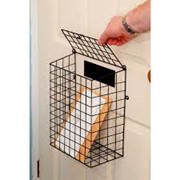

If you have any questions about the above content or any else security related, please feel free to contact me.
See my customer testimonials here
Thanks for reading
Lock changes for landlords
If you own a holiday let property, you should be well aware of the new fire regulations that suddenly hit last summer. I know many of you have been spending all your profits to ensure your properties are up to scratch for the coming season.
But what about long term lets?
Well, if you read the fire risk assessment that has to be carried out by holiday let owners, it states “any property you pay to stay in.” If that doesn’t already mean long term lets, then it certainly will if the government of the day decides that the measures taking place with holiday lets are a success. After all, the more they make you spend, the more they get in tax.
If you own properties that you let out to tenants, then it might be an idea to get ahead of the curve. Locks are being changed all the time through abuse, lost keys, evicted tenants, etc. What better time than now to make sure that the new locks going in are keyless escape versions. In the event of a fire, your tenants can get out quickly without having to find keys in a panic situation?
AC Locksmiths Norfolk can change your locks for you, We will ensure that all replacements are kite marked products, so all insurances will be valid.
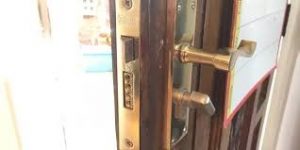
But while thumb turn (escape) locks are great for getting out easily, they can be a reduction in your security. There are tools that can go in through letterboxes and rotate the inner thumb turns, it is important to consider options to cancel this short fall. Letter catching cages are a great remedy to this, or mounting a post box outside your house, while disabling any door positioned letter plates is even better.

Changes are coming. I have spoken to several holiday let owners who have changed locks recently, only to have to change them again in light of the new legislation. It’s worth thinking about being ready for the inevitable.
Any questions regarding the above, please do not hesitate to contact me through any of my contact methods. https://www.ac-locksmiths-norfolk.co.uk/contact-us-here/
Thanks for reading.
A day in the life of your friendly neighbourhood locksmith
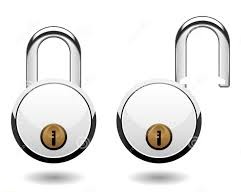
Just recently I had a call from a gentleman looking to start up as a locksmith in another county. He wasn’t going to be my competition, so I thought I’d take five minutes to answer his questions and give him some advice. Half an hour later, we were still talking and I had only scratched the surface. Being a locksmith in the UK is hard compared to other places.
From what I read of American locksmiths, their locks are pretty easy to pick but they are pretty standard, so locksmiths tend to re-key locks rather than replace the whole thing. That means they are used to dealing with the same locks day in, day out. Re-keying is where you take out the old pins, put new ones in, using a different configuration and cut keys to match. Across as much of Europe as I have been, the locks are usually euro cylinders, the type we see most commonly in UPVC doors. These are everywhere, and again, pretty easy to get through if you know what you are doing and have the correct tools.
But here is the UK, you never know what sort of lock you are going to find. Nightlatches (Yale locks), mortice (Chubb) locks in 2, 3, 5 or even 7 lever varieties, Rim locks mounted on to one side of the door with a long key, wooden doors, metal doors, composite doors, hollow doors, upvc doors and on and on and on. UPVC doors have in excess of 37 mechanism manufacturers, all whom produce multiple designs with multiple sizes of those designs. To be prepared for any situation, I would need to go to every job in an articulated lorry! If you ever think of going into this business, you must be prepared to learn a lot on the job. Even now, I am coming across things I have never seen before in over 13 years on the job.
So what is my day like? Unlike city locksmiths, being one of the few Norfolk locksmiths, my area is huge. Norfolk has quite a sparse population well spread out and with a notion that we are a ‘safe’ county. That means I can drive for up to an hour to reach my jobs. Admittedly, I do try to keep local, but right now, there is a massive shift in holiday let fire regs and I am racing across the North Norfolk coast fitting thumb turn locks for all those that need keyless escapes. That means from my base, I travel all the way to Hunstanton in one direction and as far as Happisburgh in the other. I will go further, but this is my main focus.
So, Monday means getting to the first job for 9. Mondays are always busy so this will be booked from last week. By the time I finish the first job, I’ve been interrupted by two more bookings and two or more advice calls. With something unexpected happening at the first job (customer not there because they decided to walk the dog and leave me waiting for half an hour, I am already late for the second job. But one of those calls I just received is from someone locked out with desperate need to get back in and pick up the CV they need for their job interview. They are also on a large divert from a direct route to my original second (now third job). With no time to put anything away tidily in my van (my wife never believes that), I hurry to the lock out. Five minutes away, I get the call that the lockout has found a neighbour with a key and they don’t need me. So now I am really late for the second job and have nothing to show for it. Luckily, when I get to the second job, it is really easy for me and I am away in fifteen minutes, catching up time, but not enough to keep my van tidy (honestly, wife!)
The third job is a long distance one, so there and back is nearly three hours. Unfortunately, I need to order parts, so apart from getting them secure, there is not much to do. That’s three (nearly four) visits and only two have resulted in me getting paid today (I don’t usually charge if I can’t do anything). I then come home. I have a backlog of paperwork to do, parts to order and a van tidy to ignore (tomorrow when the weather is better!) During this time, more calls come in and more appointments/queries need to be addressed via email. But Monday is my favourite day. I play football on a Monday night so it is the one time I can switch off. I have been known to go to jobs after playing 5 aside football, but now I ache too much. Any other night I am ready to go when the phone rings. This last week it was Friday and Sunday nights, but luckily on both, I was home by 11pm, so in bed ready for the next day. Tuesday is likely to be more easy jobs like measuring up for thumb turn locks, because I am a wuss with the football (maybe next day for the van tidy!). But the emergencies come in anyway and I can only hope for the long drives in between!
99% of people understand that locksmiths are different to most other traders. We don’t often get big jobs like builders. Most of our time is in between jobs. So when we turn up and get you inside your home in five minutes, the money you pay is for the time to get to you, to return home, the fuel, wear and tear on the van, the time advertising, doing paperwork and eventually tidying the van!
Holiday let owners – are you aware of holiday let and keyless exit point regulations?
In light of the new self assessment fire regulations for owners of holiday lets, here are some things I have noticed people getting wrong:
Firstly, your front door and back door may not be the only fire escapes. If you are in a room with French doors and the fire is the other side of the interior doors, then the French doors are your exit point. Every final exit door is a fire exit and therefore every final exit door must me converted to keyless escape.
Secondly, if you have a porch, the inner door must either be converted as well or left unlockable by the customers. This can be as simple as taking away that key. Alternatively, convert the inner door and remove the key for the outer porch. Either way, the entire route must be keyless escape to meet the keyless exit point regulations.
Finally, this conversion is a serious impact on security. There are tools available that can come in through the letterbox and rotate the thumb turn/push the lever. As these are your holiday lets, I doubt you get much worthwhile mail, so either invest in a letterbox guard, letter collecting basket or seal off the letter box and put a posting box on the wall outside.
So what does the conversion to keyless exit point regulations consist of?
Well, if you have a door with a lift handle mechanism then it simply means changing your double key cylinder for a key and turn cylinder
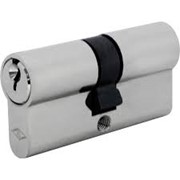
Double key cylinder
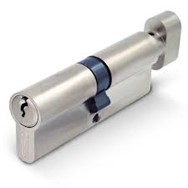
Key & turn cylinder
Prices start from £55, although I see no reason to go for high spec when you are making life easy for the burglar under these new regulations.
If you have a wooden door, you are turning this 
 into this
into this
On wooden doors, you also have the option to install a kite marked nightlatch /Yale type lock
If you need me to come and do a keyless escape conversion for you, please book a free assessment/measure up where I will give you a final no obligation quote and book you for fitting at the next convenient date. Most work can be carried out during changeover days.
It is well known that business properties, especially where the public has access, should have secure fire exit doors, which means that all locked doors should be able to be opened from the inside without a key.
But many people renting out properties for holidays do not realise that these fire exits should have easy escape capabilities. The logic behind this is that if the lock is key operated on the inside, the customers may well lock the door, put the key somewhere safe, and then should the worst happen and a fire break out, in their panic and being away from home, they could well forget where they have put the key and be caught in a tragic accident.
So if your wooden door has a nightlatch (often called a ‘Yale’ lock), and that lock has a British Standard Kite mark, you are fine.
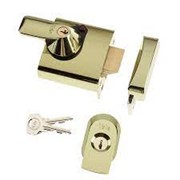
If your wooden door has a mortice (often called a ‘Chubb’ lock), with key operation on both sides, there is a conversion that can be done to use a Euro Cylinder that has a thumb turn on the inside. This means changing the lock and handles but can use the existing space with minimal visible change.
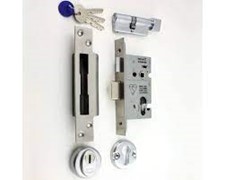
If your door is UPVC or has any mechanism where the handles must be lifted before locking, it is a simple matter of swapping the existing Euro Cylinder for one with a thumb turn on the inside.
This is a key both sides Euro Cylinder: 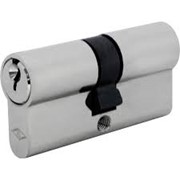
And this is a standard thumb turn Euro Cylinder: 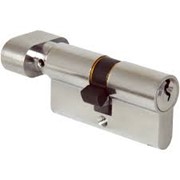
There is a slight worry with installing these fire escape systems, though and that is I have a tool that can go in through letter boxes and turn the thumb turn allowing me access to the property. We have two solutions. Firstly, certain thumb turns on the very best cylinders are designed to be difficult for tools to turn. They might require a push while turning or just plain difficult for the tool to purchase.
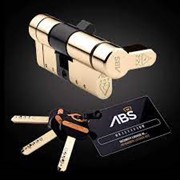
Alternatively, you can buy specially designed sloped guards for your letterbox (although even these can be bypassed with ever more clever locksmith tools).
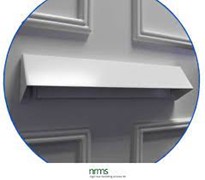
Or better yet a letter catching cage on the back of your door will stop all tools that I know of at time of writing.

If you own or run holiday lets, you might find your public liability insurance does not pay out if you have not taken the correct measures to ensure the safety of your guests.
I am noticing a lot of village halls are also suddenly finding out from fire inspections that they are not up to scratch. Please check the regulations specific to you if you run any property that is not a private home.
Click here for Government guidance on fire doors/fire safety
Should you have any questions regarding the above information, please do not hesitate to contact me.
Thanks for reading.
Common key & lock mistakes – And How To Avoid Them

It has been a while since I have produced a blog helping you to avoid needing to call out people like me. So here is a short list of common, avoidable mistakes people make that might just help you not make those same mistakes, hopefully saving you time and money.
Safe Keys
Putting override keys inside your battery operated safe: Safes are great, but if you have a key operated safe, the safe is only as good as the place you hide the key. People are quite obvious in hiding places, so digital safes are a lot better then simple key turn safes. The only problem is that digital safes have master key overrides and the safest place for these keys is in the safe itself. But if you only use your safe rarely there is a good chance you will forget about it, It gets placed in a built in cupboard, covered in clothes and out of sight, out of mind. The batteries start to die and because it is covered in clothes, you don’t hear the warning beep and pretty soon, you have a keypad that you cannot use. Thankfully, you have override keys…. But they are inside the safe. At this point, you can call a domestic locksmith who will gain access by destroying your safe and you will have to pay him for the privilege. You then have to buy a new safe. Potentially £100s because you forgot to change the batteries and left the override keys inside the safe. You can try a safe specialist to come and pick the lock, but the cost might still be £100s because safe specialists are rare (the courses and equipment are expensive) and they don’t get many calls compared to standard locksmiths.
How to avoid disaster? Firstly, take those override keys and trust a family member/good friend to look after them for you. If their house gets broken into and a burglar finds your safe keys, they have no idea what safe they open or where it is. But if they find those keys in your house, they can get into your safe. So, get those keys away from your property. Surprisingly, now your keys are not easily accessible in your safe, you will be more likely to check your batteries! But don’t rely on that. Check how long your safe manufacturer says batteries should last and halve it. Write on the calendar when to change the batteries. Use the old batteries for something else, but keep new batteries in your safe. I love Autumn and Spring because we change our clocks and this gives us a great time to do other things like regular battery changes. Have a list of other maintenance things to do like pre-winter gutter cleaning, etc, and put safe battery changes on that list. This will ensure that if you do have to call someone to open your safe, it will be because something has gone wrong rather than having to explain an expensive memory failure.
Car keys on holiday
I wish I had a sum of money for every time someone called me to say they lost their keys on the beach and the spare car key is 400 miles away on the other side of the country… Oh wait, I do! When you drive somewhere on holiday, take your spare key. When you get to your hotel/air B&B/caravan, etc leave your key somewhere safe at your destination. If you lose your car key, it will be a lot cheaper to get a bus/cab back to your holiday base than it will to call an auto locksmith to come and make a new key on the spot for you. A lot quicker too. Even when you go out on a normal day, if you have someone with you, get them to carry the spare key. If you bring the spare out and leave it in the glove box, you are making life difficult for everyone except car thieves.
Letter boxes
Sticking with cars, most cars are stolen from driveways or outside homes using the keys which have been lifted – either because the front door is left unlocked, or the thief has fished the keys through the letter box. Tools for opening locked doors via the letterbox are getting cheaper, easier to use, and ever more sophisticated. Even if you have an angled guard, there is a tool that goes around it. You might think this is a step back to your Grandma’s house, but a letter basket with closing lid, is a great way to foil the letterbox thief. Better still, seal up the letterbox, and have an external box. If you have room, get one that is big enough for parcels, We get so much delivered these days, a lockable parcel box is a great idea. At the same time, door cams record anyone approaching your door and will have images sent to your phone before they can vandalize it. But I digress..
Copy keys
If you are renting out a holiday home or have multiple carers, etc, get a locksmith to install a new lock, with all new, branded additional keys tried and tested before the lock goes in. Almost every time I get called back to job where the lock has failed, the customer shows me a key that has been copied elsewhere on some poor-quality blank. If you get keys copied and they foul up the lock, that is invalidating any guarantee the locksmith gives you, but if you are using additional keys supplied with the lock at time of installation, you are completely covered. But, if you must get copies made, make sure the original keys are the ones that get used most. I.E. let the guests use them. Yes, they might lose them (less likely if you request a deposit), but if they have poor quality keys and the lock fails and they are locked out waiting for a locksmith who destroys the lock getting in, the cost just multiplies. If you need multiple carers, please get a keysafe. It is better than having to collect keys later and ensures better keys are used.
5 lever locks
Know your terminology; there is a difference between a five lever mortice lock and a multipoint locking system. If you have a wooden door the mortice lock, (often called a ‘Chubb’ lock) is the one that should be 5 levers. If you look at the front plate, It will tell you that it is either 2, 3 5 levers and preferably will display a British Standard kite mark that tells you it has been tested against picking, drilling, sawing and most other forms of attack. If you have a door where you lift the handle and various hooks/bolts/mushrooms, etc. move, this is not a five lever lock. This is a multi-point locking system and your insurance is happy with that, which is bizarre because these systems are only as good as the locking barrel you put your key into and insurance companies are yet to wake up to how easy these can be to bypass. Again, digressing, but please talk to your local locksmith about kite-marked barrels. And if your architect/builder/designer tries to tell you these new multi-point doors without handles are a good idea, ignore them. When there is no handle, all the force of opening the door goes through the key. The leverage ratio is tiny compared doors with nice big handles, and at some point, you will snap your key in your lock.
Complacency
My last one for this blog; Just the other day, I fixed a basic lock on the top half of a stable door. It was not insurance compliant. When I challenged the customer regarding this and told him that his insurance company would not pay out if he were burgled, he replied with one I have heard often: ‘This is Norfolk. Although I know someone in the next village got burgled and lost a lot, it’s highly unlikely I will.’ So why pay for insurance at all? If you are paying for insurance, you owe it to yourself to make sure you are compliant. A second house this week is having three locks replaced after one has stopped working. I pointed out the three locks were all 3 lever and not insurance compliant, so the customer in this case, ordered new locks without delay. If you have an older house, don’t just assume the locks are up to spec. Most decent locksmiths do a free security check and, speaking for myself, when I do security checks I will tell you where advice is necessary and where advice is just personal recommendation.
This article about insurance required locks is quite good.
Should you have any questions regarding the above, please get in touch.
Thanks for reading
Smart Locks again
Is now the right time for a smart lock?
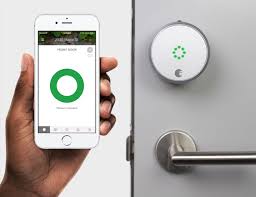
Smart speakers, smart cars, smart fridges, smart thermostats, smart light bulbs, the list goes on and on. In that list are a massive number of smart locks. You can find them all over the internet, from the very cheap to the ultra expensive, basic to very flashy.
But the big problem with almost all of them, is that they will compromise your security, or you will need a whole load of other stuff to make them work. If you have a smart lock on a standard wooden door in the UK, the chances are it will be a latch lock. The problem here is that UK insurance companies don’t like latch locks because the latch can be ‘slipped,’ an attack method that can silently take seconds to get into your home with the correct, very cheap equipment. British Standard (BS3621) latches are allowed but the springs are much stronger on these making smart conversions a bad idea as there is a good chance of over-burdening the turning motor inside the smart lock. There are solutions for wooden doors, but you should really expect to allow a further £200 minimum for the needed conversions, and it would be much better to consult your local locksmith to ensure the end result will meet your insurance company requirements.
If you have a door with a euro cylinder (the type where you normally lift the handles before locking/unlocking), then insurance requirements are not the issue. The issue is the whole lifting handle before your smart lock can do anything smart. For example, on a standard door, you will have to either not fully lock your door when you leave, (only possible if the outer handle is a dummy handle that does not retract the latch) or you lift handles, use your phone to do what the key would have done and leave. Then, when you come back, you use your phone to unlock, physically push the handles down to disengage the bolts, etc, and then use your phone again to open the latch and have the door swing open because that is what you wanted the smart lock for – to have the door open for you when you are carrying lots of stuff. So here, you gain nothing over a straight forward key. I do know of one company that does a complete smart lock/handle, but it is stupidly expensive, only works with the same brand locking system, and the two I have fitted both failed to set up properly.
So my advice is this. Think long and hard about that smart lock. First and foremost, is it going to compromise your security? Secondly, is it actually going to make life easier? Is getting out and firing up your smart phone, searching for the app, searching for the right button within the app, turning it all back off again, etc, actually better than just pulling out your key and turning the lock? Thirdly, ask your local locksmith, and if your locksmith suggests an alternative, ask him/her to explain exactly how their solution meets the above requirements.
Thanks for reading
Previous Smart Lock blog here
Problems with copy keys
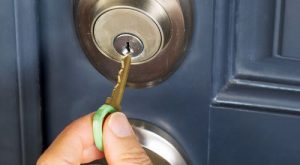
Does your lock require a Knack for getting it open? Does one side open better than the other? Does the lock stick sometimes and need be jiggled to work correctly?
All these are signs you have been using badly cut keys. Look at the key you are using in your lock. If it doesn’t have the same brand name on it as the lock, it is a copy. Key cutting shops use generic brands like JMA because one key will cut for several brands. This makes things easier and cheaper for the key cutter, but the copy brands are often made with cheaper materials, as this means less wear and tear on the cutting blades for the machines. If key cutters used genuine branded blanks all the time, they would go through more cutting blades and instead of throwing away a cheap copy if you bring it back, and it becomes a more expensive throw away if they don’t get the cut right first time. For them to use genuine blanks, prices of key cutting would have to double at least, but more likely triple.
For the person cutting the key, they only have your original to work from, and often people bring in copies to copy from. Ideally, you would take the lock so they can test the keys before you take them, but that is very unlikely to happen.
So, when you are thinking of changing locks, think hard about the number of keys you require. Most locks come with two or three keys as standard, so any more will have to be ordered. Ordering additional keys with the lock ensures you get branded keys that have been tested before the lock even goes anywhere near your door and keeps your guarantee sound. A locksmith fitting your lock can easily claim any failure could be down to poorly cut keys should you have more cut elsewhere after he/she has done the work. And they would more than likely be correct. Only today, I changed a lock for a couple who had six copies made from keys of a lock I fitted about 5 years ago. Some worked inside only, two worked outside only and one had to be pulled back slightly to work on either side. Between them, they were wearing the pins away so that even once the original keys were found, those originals were not quite right. The worst of it was, they didn’t even need that many keys. Remember, there were just the two of them. Three original keys and six extra copies. A keysafe would have been a better option than so many extra keys.
Based in Holt, AC Locksmiths covers a large part of North Norfolk, including the north coast towns of Thornam, Brancaster, and the Burnhams. We go to Hunstanton, Snettisham, Dersingham and Heacham. And not forgetting locksmith services in Docking, the Rudhams, North Creake, South Creake, Walsingham, Little Snoring and Great Snoring.
Thanks for reading
Changing the locks on a brand new property
There seems to be a massive drive to build new homes lately. Almost everywhere you go, you are bound to be driving past a new build construction site. You might even be looking at a nice newly built home in your area, or even bought one. The beauty of a new home over an older one is that you can move in knowing you have nothing to do. The carpets are already fitted to your criteria, the sparkly kitchen gleams and there is no worry that some random neighbour has a spare key to your home, so why are we advising changing the locks on a brand new property?

Why change the locks?
Quite frankly, the developers will do the minimum possible to meet regulations, and currently in the UK the regulations just are not up to the same level as the burglars. New homes are all being built with multi-point locking mechanisms and while all the hooks, bolts and rollers look impressive and secure, the system is only as good as its’ weakest part, which is the locking cylinder. While standard locking Euro Cylinders are acceptable for insurance purposes, they are incredibly weak to a form of attack called ‘cylinder snapping’. Property developers will use these standard cylinders wherever possible.
Some of the more reputable developers will at least have the decency to install kite marked Euro cylinders in their doors, but beyond the kite mark, there are still three grades of security, which cover the three main forms of attack, those being snap, pick and drilling. So a cylinder with one star will be proof against picking but not the other two, and a cylinder with two stars will still be susceptible to attack by one of the three main methods. You can supplement the star rating by having anti-snap collars placed inside the handles, or anti-drill handles. You may even have these, but if you don’t know, then the burglar doesn’t know either and he is likely to have a go, fail and leave your door a mess before he leaves. Only a three star cylinder should be used if you want the burglar to go away before even trying.
With total honesty, there is a tool that can be purchased to bypass even some of the best three star cylinders, but it takes time use and is fiddly. Entry with this tool is trial and error, sometimes taking many minutes to get in the door, whereas a standard cylinder can be snapped in under 60 seconds with household tools and no sound. For the same reason a burglar will not take the time to remove your roof tiles and enter that way, he will not purchase a tool that takes him many times longer to get in than the cheap tools he can get from a DIY store.
Cylinder snapping is no longer about normal burglary any more; Intruders know that most people leave their car keys somewhere in the vicinity of the front door, be they left on a surface, hanging on a convenient hook, or just in a coat pocket. They can now look for the car they want to steal parked nicely on your front drive. As most of us are now two car families, at least one will sit on the drive, and if that car is your brand new Mercedes or BMW and you keep your keys close to an easily attacked door, your insurance might decide not to pay out because you didn’t take enough care. How many people tell their insurance the car is kept in the garage, knowing that actually the garage is full of the toot we don’t want in our actual houses? Breaking into a house and stealing the keys is now the easiest way to steal their car.
And while a barking dog is a deterrent to some degree, what protects your home when you are on holiday or even out walking that dog?
Most three star Euro cylinders are visibly different to standard cylinders. They shout at the burglar you are serious about home security and that attacking your home is going to be noisy and time consuming. Noise and time are the enemy of the burglar. If he knows breaking into your home is going to be noisy and take up precious time, he is going to move on. If you fit the proper cylinders, chances are you will be angry with the locksmith after years and years of never seeing any signs of attack. You will never know how many intruders scouted your home and mentally noted to leave you alone. It’s not hard. I help my kids with their paper round, and the best locks stick out like a sore thumb. I know exactly how few there are and where they are. A potential intruder only has to deliver some bogus leaflets in any area to work out who is best avoided.
While on this subject, an emailed question asked if it worth putting extra strength glue in an externally beaded window so that if the burglar got the beading off the window would still be stuck in place. Beading removal was never a hugely popular method of attack. There was always too much potential to make noise and take a long time. Also, the risk of breaking glass and then cutting oneself is too high, even without extra glues. Cylinder snapping is quick, quiet and easy. So faced with a choice, you should always upgrade your cylinders.
If you have standard cylinders or even kite marked one star cylinders, you should upgrade now. If you don’t know what you have, a good locksmith in your area will come and assess your locks via a free security check. Unless a locksmith has provided your locks, I very much doubt they will be the best on the market. You cannot buy the best locks in the DIY shops. While you are ensuring you have the best locks, you should be sending a copy of this information to everyone you care about, because of the following reasons:
- Burglary is on the rise.
- Traditionally ‘safe’ areas are being burgled more often.
- Only a tiny fraction of burglaries get investigated by police.
- You are now at risk from car thieves as well.
- Burglars pass on information to each other, so if you are burgled once, you stand an increased chance of being hit again.
- Every person I speak to who has experience a burglary, reports feeling of personal violation, sleepless nights and detachment from their home.
If you have any questions regarding the above information or any of the other blogs I have written, please get in touch via any of the methods on my contacts page.
Thanks for reading.
New build Holt, New build Fakenham, New build Aylsham, New build Cromer,
New build North Walsham, New Build Norfolk, Locks Holt, Locks Fakenham,
Locks Aylsham, Locks Cromer, Locks North Walsham, Locks Norfolk
Smart Locks – Again! I am having a growing number of people asking me for help with smart locks they are buying for themselves. Many of you are expecting simple installation (as advised by the manufacturers) only to find things a bit more complicated than you might expect. The same can be said for some smart doorbells and supposedly easy installation security equipment like smart CCTV and alarms.
Smart security is still a young technology. Smart locks can decrease your security level and even make your insurance void in many cases. A lot of smart locks are aimed at an American market and their lock requirements are not as stringent as ours.

Smart locks are not always more convenient than key operated locks either. With a key operated lock, you take your key out of your pocket as you approach your door, and you are in without thinking about it. With a smart lock, you might have to carry a tag (easier to break than a key) or you might have to get out your phone, wait ages for the phone to recognise your face/thumbprint/pin code, find the app, open the app and then find the unlock button within the app.
Smart doorbells/doorcams can take loads of footage and send you endless emails of people passing your property but not actually approaching your door, or better still the spider web spun overnight and blowing in the breeze, setting off the sensor. You have to weigh up the options of battery (not good if your door opens onto a busy street) versus mains power (might need long wires or an electrician to wire it in safely).
Your smart CCTV might not be able to tell the difference between a small dog and a human, in which case you are going to be poring through hours of watching what Fido was doing while you were out all day while Fido himself is desperately waiting for you to take him walkies!
And smart alarms can be much better than you thought. Would you like your elderly Mum to just have an alarm for when she goes out to the shop, or would you like a system where if she takes a fall, she can press a button on a neck loop and the alarm system not only calls you, but lets you speak two-way to asses the potential emergency. Do you want your alarm system to incorporate a smoke detector and CO2 detector. Which virtual assistant device do you want it to be compatible with? Do you want it easy to take with you to a new property? Do you want it future proof or easy to do add-ons in order to keep the initial cost down?
There are so many things to think about when buying smart security products and they are rarely as easy to install as their blurb would have you believe. Any decent locksmith/security installer will provide you with free advice and quotations. You should always consult a professional before purchase. Not the person in the shop, but a person who installs and knows the pitfalls.
If you have any questions regarding the above information, please do not hesitate to contact me via email or phone 07846643176
Thanks for reading!
Previous Smart Lock posts: When is a smart lock not so smart
Smart Locks – what you need to know



















